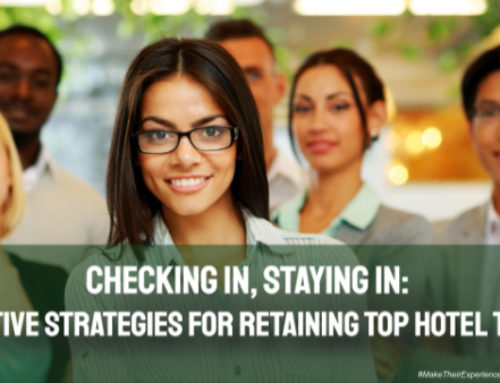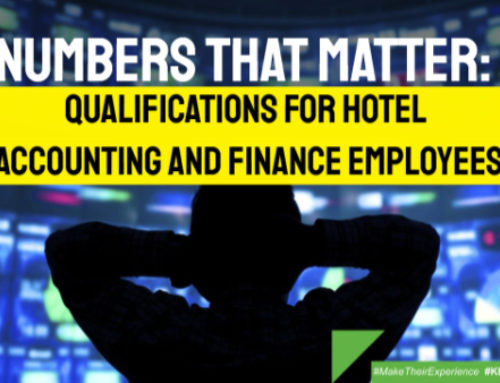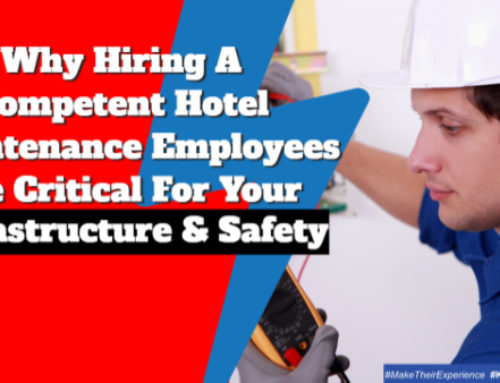.
.
If you have a bad online reputation or it’s lacking, you’re losing money.
I will share just how important your online reputation is and how a good one can be the difference between a hugely successful property and one that is struggling.
Welcome to another edition of Hospitality Property School.
I am your instructor, Gerry MacPherson.
.
Online Reputation Introduction
Online Reputation Management (ORM) is as simple as it sounds for your hotel, resort, inn or bed and breakfast etc.
.
It is a method by which hospitality properties can oversee, influence and improve the feedback that guests leave about them online.
.
The World Wide Web has changed the way commerce works in an untold number of ways, but most importantly, it has changed the dynamic of information between a guest and a hotel, resort, inn or bed and breakfast.
.
Previously, the flow of information was one way; the hospitality property would advertise and provide information about their property, but the customer had no consistent way of providing feedback. There was the old saying about a dissatisfied guest telling up to eleven people, but that was about as large scale as the feedback could get.
.
The internet altered that.
.
eBay was the first company that made leaving feedback for seller’s normal, but now it has grown to cover almost everything that can be purchased online.
.
Consumer services have grown to become an industry on their own for such things as financial services, home improvement providers or car sales.
.
It has become an integral part of those businesses but, nowhere has an online reputation become more important than with the hospitality and travel industry.
.
It has become very common for people to leave feedback and crucial for hospitality properties to manage it.
.
 |
Books with Tips & Strategies for Your Hotel, Resort, Inn,
|
.
Internet and the hospitality property industry
No one should be surprised that the internet has revolutionized the hotel, resort, inn and bed and breakfast industry, but it is worth measuring just how much it has changed, drilling down into the specific ways that people research and make bookings, and how Online Reputation Management fits into the procedure.
.
In 2001, just 1% of all hotel bookings were carried out online. In 2011, depending on the measure used, it was anywhere from 35% to 50%.
.
Today, 65% of hotel bookings are made online via smartphone. The percentage of travel reservations via the internet is 57% and that shows no sign of slowing down.
.
It is of vital importance that hospitality properties have a strategy in place for managing what those researching customers see when they look at the reviews of their property.
Key Review Sites
In general, there is no one site that can be targeted with an online reputation management strategy, since virtually any online travel agency has the ability for guests to leave feedback about a property. However, there are a couple of larger sites that have particular sway in this market, and they provide a good picture of what might be seen on other sites.
.
TripAdvisor is the largest site in the industry, and has comfortably the highest-profile, receiving over 390 million monthly unique visitors, according to their own statistics.
.
TripAdvisor is by far and away from the most powerful and is almost always the first site that people consult. Indeed, many travel agencies and booking sites carry links through to the TripAdvisor page of individual properties in order to help the customer do that.
.
Nevertheless, there have been problems. It has been publicized that false reviews have been posted on the website, both by people trying to raise the perception of their own property and by those trying to tarnish the image of rivals. Because of this, the reputation of TripAdvisor has become slightly dented, but it still retains enormous power.
.
Others that hold sway in the industry are those that provide booking services. Orbitz, Travelocity and Expedia are the ones to be particularly aware of, because they have the largest number of users by some distance, though their approach to feedback mechanisms does vary. The importance of these sites is that people will see the reviews at the point of booking, and a negative review profile can make potential customers choose another property.
.
Next, social media. People regularly post location-based updates that people can comment on, and others can view, so it is vital that you remain aware of what is being said, and engaging in a positive way.
.
The final type of review site comes from providers of travel guides. The key sites are Frommers and Fodors, though these sites tend to rely on their experienced staff rather than customer reviews, they should be kept in mind.
.
.
Why Does ORM Matter?
I have spoken with some property owners who have said that their Online Reputation Management does not really matter. Even if you were to get a bit of bad feedback online, it will either blow over, or you could try and compensate the balance with some discounts and marketing activity.
.
Wrong!
.
The global trade bodies for the travel industry have researched this considerably, and they have found that reputation management could not be more important.
.
A slowdown in bookings due to bad reviews cannot be countered with discounts. Extensive research has shown that any increase in the volume of sales driven by discounts is nowhere near enough to recover the lost original business.
.
Even more important, past experiences, reputation, recommendations and online reviews…are now more important to potential guests than either location or price.
- 96% consider reviews important when researching a hotel
.
- 79% will read between six and 12 reviews before making a purchase decision
.
For properties that generate the largest profit margin from corporate and business travellers, research indicates that over 85% of purchasers in this segment consult social media and reviews before making their purchase decision.
.
In terms of the impact on detailed financials, the evidence is compelling.
.
According to Expedia, a good review of 4.0 or 5.0 will deliver more than double the conversions of a review of 1.0 or 2.0. Research has also found that when it came to hospitality properties, customers were willing to pay a minimum of 20% more, but potentially up to 90% more, for a property with five-star customer reviews compared to four stars.
.
In financial terms, the importance of online reputation management is beyond any doubt.
.
These statistics prove that the online perception of a property is absolutely crucial to its financial feasibility. It, therefore, makes sense to invest just as much into online reputation management as you would into the facilities, fixtures and fittings of your property.
.
A good investment will always pay dividends, and so spending on reputation management should be seen in that light.
.
Investing in ORM supports your investments in other areas such as advertising, marketing and promotional activities.
.
If you aren’t managing what people read about you online, then much of this investment may go to waste when people read something negative about your establishment. There is no point in spending a budget on raising the profile of your property if your profile is tarnished.
- Four out of five believe a hotel that responds to reviews cares more about its customers
.
- 85% agree that a thoughtful response to a review will improve their impression of the hotel
.
.
Online Reputation Management Best Practices
There are three golden rules that should be followed when managing your online reputation.
-
Never ignore negative feedback
You can’t be perfect all the time, and you need to have a clear process in place for when people leave a negative review of your property. Responding to a complaint in a clear, polite and positive fashion creates a much more favourable impression with potential customers than simply doing nothing. Never react in an aggressive or impolite manner, even if you feel the complaint or poor rating is unwarranted.
.
-
Encourage your customers to leave positive reviews
Customers are more likely (up to 7X) to leave a review or share their opinion if they have had a negative experience.
You need to be proactive in getting people to leave positive recommendations. If your customers say something nice to your property, ask them to put it online. At the point of check-in and check-out, ask your customers to leave positive feedback if they have had a good time.
.
-
Don’t be tempted to try and game the system
Earlier in the post, I mentioned that properties have tried posting false reviews on websites like TripAdvisor. Now, there is a growing list of properties that have been blacklisted from online travel agents for such activities. Don’t be tempted, you will be found out.
.
.
Can You Do Online Reputation Management Yourself?
If you have the time, there is nothing to stop you from trying to manage your online reputation yourself. You can register as a hospitality property proprietor on most sites, and address the customer interactions yourself. Similarly, you can manage your presence on social media.
However, you should probably consider the following questions before you decide to do that:
.
Have you really got the time?
Running a property is hard enough and depending on the size of your property, a realistic strategy for ORM could involve hours a day when you consider the number of websites and social media channels involved.
.
Do you know all of the channels that you need to manage?
The scale of the online travel industry means that there are literally thousands of sites online. Do you have the knowledge to find them, and to track changes in the online industry?
.
Do you really know what to say and do for the best effect?
There is an art to how to deal with people online, and a range of techniques that can be deployed, like the semantic analysis. Do you know what they are, or have the inclination to learn about them? How expensive and time-consuming would it be to train your staff to do it?
.
Like all major investments in your property, you need to be professional with your online reputation management. Partnering with an established, successful and ethical ORM company will pay huge dividends over time.
.
The effects will not be instantaneous, but outsourcing to a professional reputation management firm will allow you to achieve an ORM strategy, but at a considerably less expense and time investment, than training your staff to do it.
.
Online is an excellent way to market your business.
.
Today, the only way for a hospitality property to stay competitive is to have a prominent online presence but there are still some properties that are stuck in their old ways, are stubborn or are just straight-up scared of change.
.
It’s true that hotels, resorts, inns and bed and breakfasts thrived long before the internet was invented but now there isn’t a single hospitality property that can’t benefit from marketing online.
.
When a property decides to make a change and increase its online presence, with all the digital tools available, choosing the tactics to best help you stand out, can sometimes be confusing.
.
Are these making sense? Let me know by leaving a comment below
.
Here are 9 proven ways to improve your online visibility.
.
-
Learn correct website optimization
SEO (search engine optimization) is a term that scares many business owners because they are under the impression that it’s a complex process that will be impossible for them to understand. Fear not, there are basic primary website optimization techniques that are easy to understand and implement.
.
Now, that is important but it is also important to know that last year, Google fundamentally altered how they crawl websites, moving from “PC-focused” to “mobile-focused”, so you have to make sure you optimize your visitor’s mobile experience.
.
If it’s been more than a few years since you overhauled your existing website, strongly consider budgeting to build a modern, mobile-friendly, and more productive website.
.
It is more important than ever.
.
Many older hospitality property websites may have been designed with a mobile as an afterthought. A slow, laggy or poorly laid out mobile website will lower your search engine page ranking and your online visibility but today, the mobile experience is a primary consideration when it comes to SEO and Google’s assessment of performance.
.
You need to make it a priority to fine-tune your website’s mobile interface, making it a frictionless experience on large tablets and tiny phones alike. Test your site on both top-of-the-line devices and less-expensive products with more modest processing power.
.
.
-
Publish regular blog content
Content is still king.
.
Publishing regular content is a great way to increase your online visibility and attract traffic to your website.
.
Whether it’s a blog, social media, podcast, or newsletter, the best way to drive traffic to your website is to create a wide variety of useful and interesting content. Publish travel tips, vacation stories, what-to-eat insights, relevant community news, and lots of content regarding local events.
.
If you delight your visitors, they will be more likely to share your content on social media, which can introduce additional consumers to your property.
.
Get creative, invite submissions from guests and community members, and give intrepid travellers a variety of reasons to make your property their home away from home.
.
.
Other techniques to consider…
· Feature “Best Of” Posts
Drafting a “best of” style blog post affords an opportunity to cycle some of your best-performing content back into the rotation.
.
· Intertwine Internal Links
When drafting fresh content, don’t forget about the content that came before.
Weaving relevant internal links (links that jump to other pages on your website) into your posts is an SEO best practice and a proven strategy to increase the duration users spend on your website and lower bounce rates.
.
-
#Throwback on Thursdays
You’re probably already acquainted with the #TBT movement.
Hotel brands have made “throwback” posts their own by revisiting images from property milestones and posting historic photos. Other winning ideas include publishing archive photos from the property’s immediate area or nearby points of interest.
.
· Syndicate and Share
Sharing your posts via your brand’s social channels is only a first step. Think about actively sharing links on relevant discussion boards, such as a travel forum on Reddit.
You should also share relevant property posts in professional circles, such as LinkedIn.
.
.
3. Offer an App
Frequent guests and loyalty rewards members particularly enjoy the convenience of the app format.
.
The most advanced apps may include phone-activated room locks, mobile self-check-in and access to other amenities, but even basic apps that offer reward point tracking and further personalize the guest/hotel relationship provides value and drives loyalty.
.
Not only does an app offer a wealth of personalized marketing opportunities, but its mere existence also increases digital visibility by creating an entry in the app store.
.
Your app can also include features as:
- room service menu
.
- the ability to book spa appointments
.
- tours
.
- a calendar of local events
.
- discounts and offers
.
.
-
Get active on a few social media networks
There are a lot of social media networks, which makes it very difficult to effectively participate in all of them. Select two to three that you know that your target audience is active on.
.
Before I carry on, have you checked out the Hospitality Property School Group? In the resource section, we have gone into more detail about different social media platforms that you can download. To see more about the group, check out the video in the episode show notes.
.
.
5. Build Landing Pages for Local Attractions
Use the marketing potential of local events and attractions.
.
Build a dedicated landing page for each of the most unique events and attractions in your community. Be creative in how you showcase event info.
.
With attraction landing pages, travellers who do online searches for the attractions they want to visit can easily find themselves on your website. Provide an abundance of fun pictures, videos, and useful information along with how your property will help guests get where they want to be. Don’t forget to include call-to-action links that encourage visitors to book through your website.
.
.
6. Consider Niche Services and Their Keywords
Niches are a powerful origin for keywords.
.
People often have special travelling requirements and will only book with properties that can accommodate their needs. Perhaps they have very small children, food allergies, a disability or support animals they travel with. Chances are that your property caters to some of these niches even if they are not a “brand specialty.”
.
Take the time to research niches, then expand your marketing message to include pages and articles for these special groups.
.
.
-
Run targeted Facebook ads.
Facebook ads allow you to create very specific ads and place them in front of a custom audience that you select. With Facebook ads, you can attract the perfect audience with booking-intent to your website.
.
.
-
Guest blog on relevant websites
Guest blogging provides you with two great benefits.
.
First, you are exposed to a much-targeted audience, one that will have a high likelihood of being interested in your region.
.
Second, you benefit from the links in your author bio, which helps your search engine optimization and can also drive targeted traffic back to your website.
.
.
-
Encourage your customers to leave online reviews
Online reviews help to improve your online visibility by increasing your footprint online. If your property is listed next to a competitor in the search results and you have 50 positive reviews and the competitor doesn’t have any, what property is the average traveller going to book? The majority of customers research properties before doing business with them, so make it easy for your customers to access your review profiles by creating a dedicated page on your website that features all of those links.
.
.
In Conclusion
In this post, I shared just how important Online Reputation Management has become, the impact on the hospitality property industry, and your revenue.
.
By using the nine techniques I shared on a consistent basis, you’re defiantly going to stand out with your target customer and get more eyes on your website.
.
Is an online reputation important to your business?
Let me know in the comments.
.
You will have access to this episode for the next six weeks and then it will get locked in the vault for Hospitality Property School Group members only.
.
When you see that we have something new, don’t mark it “Unread” or file it away in the belief you’ll read it later because you might miss your chance.
.
To see all the other valuable material you’d have access to as a member of the Hospitality Property School Group, check out the short video in the episode post-show notes.
.

.
.
In the next episode, I will talk about asking for referrals.
.
.
That’s it for today’s episode,
Until next time, have a fun day.
.
Are you getting your weekly INNsider Tips? You can find the link in the show notes.
.
⇒ TO READ OR LISTEN TO THIS EPISODE ON KEYSTONE HOSPITALITY PROPERTY DEVELOPMENT:
https://keystonehpd.com/online-reputation-management-proven-techniques-236
.
.
Join the 6 Day Challenge Video Series
https://keystonehpd.com/6-Day-Challenge
.
.
Get Your INNsider Tips
.
.
Join one of your private groups
https://keystonehpd.com/private-groups
.
.
Say hi on social
Facebook: https://www.facebook.com/KeystoneHDC
.
Twitter: https://twitter.com/KeystoneHDC
.
LinkedIn: https://www.linkedin.com/company/keystone-hospitality-development
.
.
Listen to The Hospitality Property School PODCAST here
keystonehpd.com/hospitality-property-school-podcasts
.
.
YouTube
.
.
A Division of Keystone Hospitality Property Development
.






